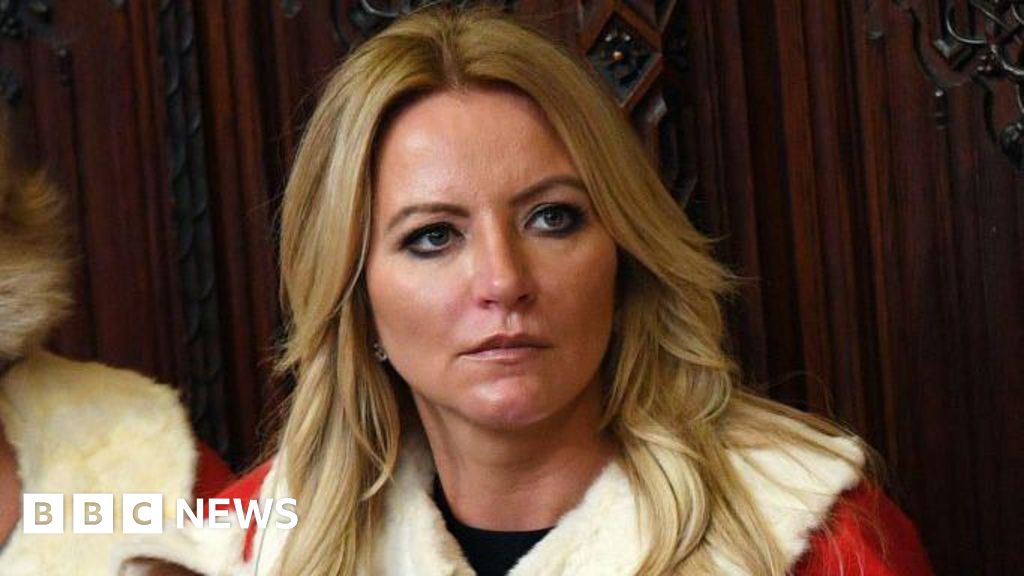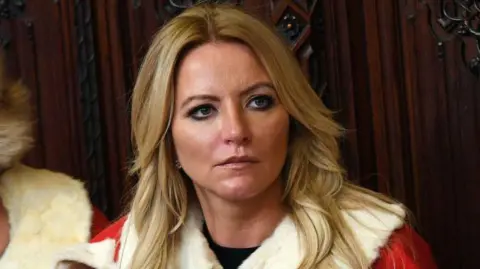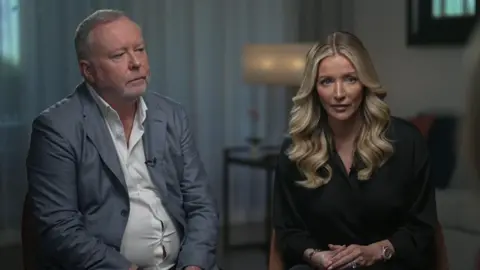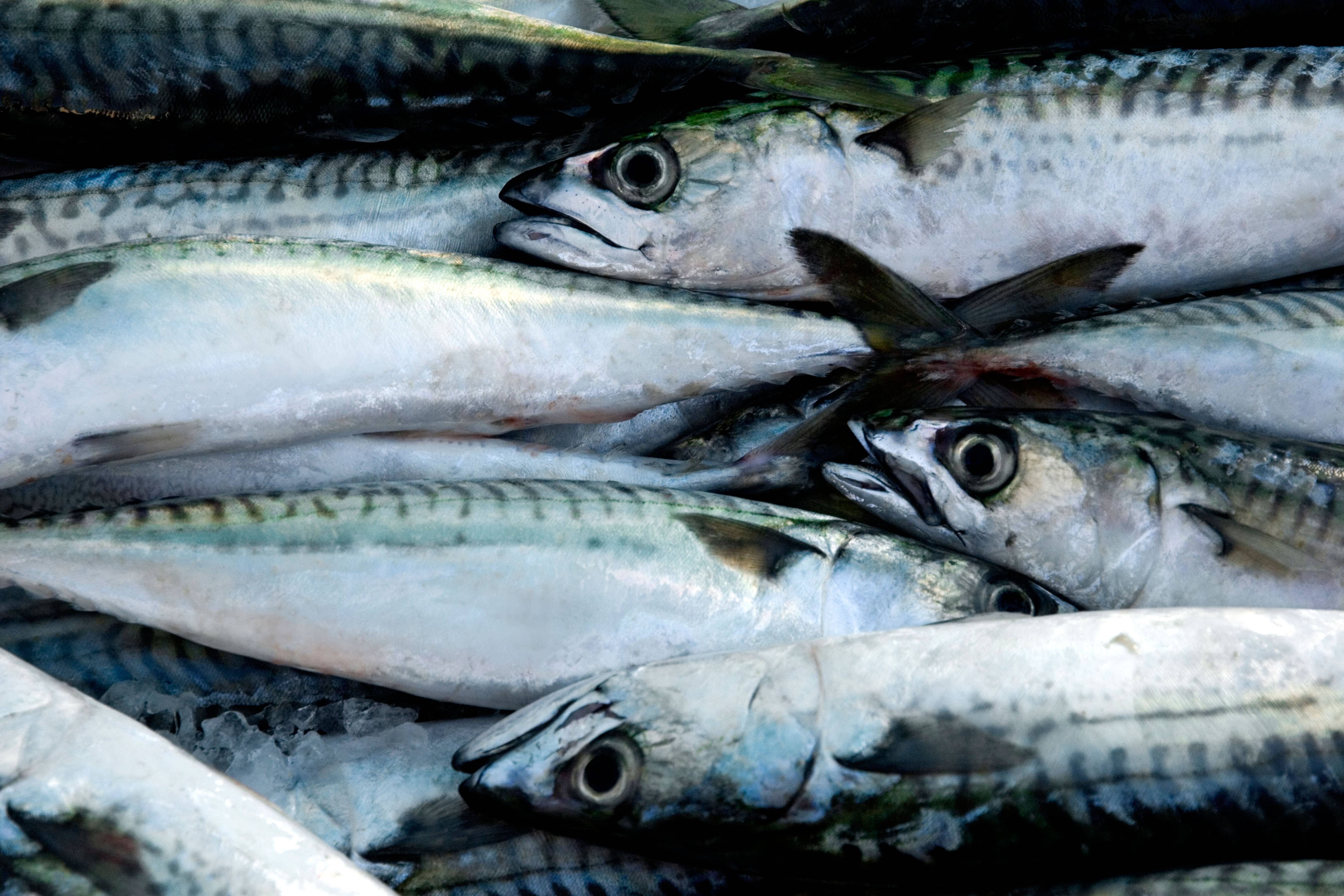Business
High Court rules Baroness Mone-linked company breached £122m Covid contract

Rachel ClunBusiness reporter
 Getty Images
Getty ImagesA company linked to peer Baroness Mone and her husband Doug Barrowman has been ordered to pay £122m in damages after a judge ruled it breached a government contract for the supply of personal protective equipment (PPE) during the Covid pandemic.
The Department of Health and Social Care sued PPE Medpro over claims the medical gowns it supplied did not comply with relevant healthcare standards.
The High Court ruled Medpro failed to prove whether or not its surgical gowns, which were to be used by NHS workers, had undergone a validated sterilisation process.
Chancellor Rachel Reeves said it was beyond her powers for Baroness Mone to be stripped of her peerage.
But speaking to Matt Chorley on BBC Radio 5 Live, Reeves said: “I hope she won’t be back in the House of Lords.”
Peerages can only be removed by an act of Parliament. While a life peerage cannot be relinquished, Baroness Mone could choose to resign from being a member of the House of Lords.
Reeves said she would “do everything” in her power “to get that money back” and that the money belongs “in our schools, in our hospitals and in our communities”.
During the outbreak of the Covid pandemic in 2020, the government scrambled to secure supplies of PPE as the country went into lockdown and hospitals across the country were reporting shortages of clothing and accessories to protect medics from the virus.
In May that year, PPE Medpro was set up by a consortium led by Baroness Mone’s husband, Doug Barrowman, and won its first government contract to supply masks through a so-called VIP lane after being recommended by Baroness Mone.
The judgement said the government later ordered 25 million sterile gowns from Medpro, which were delivered in August and October 2020, after being manufactured in China.
However, just before Christmas that year, the Department of Health served the company with a notice rejecting the gowns and asking for a refund.
The judgement said the government decided it was “not satisfied that the gowns were contractually compliant” after inspecting them, and claimed subsequent tests conducted found “a number of them were not sterile”.
Paul Stanley KC, representing the government, told the trial that of 140 gowns that were tested, 103 failed.
It led to the government launching legal action in 2022 through the High Court, claiming the gowns did not comply with the agreed contract.
Medpro, however, argued it had complied with the contract and that the gowns were sterile.
Having previously denied gaining directly from the contracts, Baroness Mone, a former Conservative peer and lingerie tycoon, admitted in December 2023 that she stood to benefit from tens of millions of pounds of profit.
She also admitted to the BBC that she and her husband lied about their involvement with Medpro to avoid “press intrusion”.
The court found firm’s director Anthony Page called on his “big gun” – Baroness Mone – during negotiations in order to secure the gown contract.
In the court ruling on Wednesday, Justice Cockerill said the contract between Medpro and the government was “complex”, but found that the company did in fact have to demonstrate it had undertaken a “validated sterilisation process”.
“That was not complied with by Medpro,” she said. “It followed that Medpro had breached the contract.”
The ruling also said the gowns lacked the “notified body number” required to mark them as sterilised, and that Medpro had provided no evidence such a process had taken place.
Medpro had also argued that the government could have sold the gowns if it no longer wanted them, or repurposed to be used as non-sterile or isolation gowns.
During the case, the company said any lack of sterility or valid sterility marking “did not prevent the said gowns from being used within the NHS or from being sold to third parties outside of the EU”.
Justice Cockerill said there were problems with that argument, including the fact that the NHS did not need any more isolation gowns.
However, she noted that the DHSC did not effectively reject the gowns within a reasonable timeframe, and also dismissed the government’s claim for £8.65m in storage costs over lack of evidence.
The judge ruled the company must pay £121,999,219 in damages, plus interest, however, it remains unclear how Medpro will pay the fee, with the company appointing administrators the day before the court decision.
Its last set of accounts said it only had £666,025 of shareholders’ funds.
The court said the firm had until 15 October to pay the damages to the government.
Speaking after the judgement, Chancellor Rachel Reeves said the government was working with administrators and “all different authorities” to try and claim the money.

‘A win for the establishment’
In response to the ruling, Baroness Mone said it was “shocking but all too predictable”.
“It is nothing less than an Establishment win for the Government in a case that was too big for them to lose,” she said in a social media post.
A spokesperson for Mr Barrowman described the ruling as “a travesty of justice”.
“[Mrs Justice Cockerill’s] judgment bears little resemblance to what actually took place during the month-long trial, where PPE Medpro convincingly demonstrated that its gowns were sterile,” the spokesperson added.
Baroness Mone was once described as one of the UK’s most successful businesswomen, creating the gel-padded Ultimo bra in the late 1990s.
In 2015, then-Prime Minister David Cameron made her the government’s “entrepreneurship tsar”, and shortly after she became a Conservative peer.
The next year she announced she was in a relationship with Mr Barrowman, a billionaire businessman who founded The Knocks Group of Companies and was a director of Aston Management Limited.
In December 2022, Baroness Mone sought a leave of absence from the House of Lords.
Neither Baroness Mone nor Mr Barrowman appeared in court for the decision.
A separate National Crime Agency (NCA) investigation into Medpro was launched in May 2021, into suspected criminal offences committed over the procurement of PPE.
An NCA spokesperson said on Wednesday its investigation was ongoing.
Business
The NBA doesn’t just want to build a European basketball league — it wants to revolutionize the international pro game
Business
Major UK supermarket to stop selling mackerel in coming weeks

Waitrose is set to remove mackerel from its shelves amid escalating concerns over unsustainable fishing practices.
The retailer said that it is the first major UK supermarket to suspend sourcing of the popular fish.
It said that fresh, chilled, and frozen mackerel, primarily sourced from Scottish waters, will be unavailable to shoppers by 29 April. Tinned varieties will follow once the current stock is depleted.
Conservationists are welcoming the move and urging other supermarkets to follow suit.
The measure comes as governments have repeatedly failed to implement catch limits recommended by scientists, jeopardising the long-term viability of mackerel stocks.
The International Council for Exploration of the Sea (ICES) has issued stark warnings, advising a 70 per cent reduction in catches for 2026 across all regional mackerel stocks compared to 2025’s recommended levels.
With the stock consistently fished above sustainable thresholds, this translates to a 77 per cent cut on the 755,143 tonnes scientists estimated would be caught in 2025.
Overfishing has resulted in depleting mackerel stocks in the north-east Atlantic, with Ices saying the species, and the wider fishing industry, could face long-term risks unless countries stick to recommended catch limits.
Waitrose said the decision in December by four of the coastal states which fish mackerel to cut catches by 48 per cent was a step forward, but did not meet Ices advice.
North-east Atlantic mackerel will no longer meet the supermarket’s responsible sourcing requirements in line with the Sustainable Seafood Coalition codes of conduct, the retailer said.
Jake Pickering, head of agriculture, aquaculture and fisheries at Waitrose, said: “By suspending sourcing of mackerel at Waitrose we are reinforcing our ethical and sustainable business commitments, acting to tackle overfishing and protect the long-term health of our oceans and this crucial fish.
“Our customers trust us to source responsibly, and we are closely monitoring the fishery.
“We look forward to bringing mackerel back to our shelves once it meets our high sourcing standards.”
As alternatives, Waitrose is launching a new range of fish products including hot smoked herring, hot smoked peppered herring and hot smoked sweetcure seabass, all of which are Marine Stewardship Council (MSC) certified.
The retailer said it would also introduce MSC-certified frozen sardines from May as a sustainable replacement for frozen mackerel, and plans to become the first retailer to sell 100 per cent MSC tinned sardines.
Waitrose said it would maintain its relationship with its mackerel suppliers and its new supply of herring, seabass, sardines and trout will be sourced through current supplier partnerships.
But there is currently no predetermined time-frame as to when Waitrose will start sourcing mackerel again.

Marija Rompani, director of ethics and sustainability at the John Lewis Partnership, said: “We believe sustainable food production must balance climate action, nature protection and responsible fish sourcing is fundamental to protecting our oceans.
“We will continue to work closely with suppliers and industry partners to support the recovery and responsible management of fish stocks.”
Charles Clover, co-founder of conservation charity Blue Marine Foundation, said mackerel – one of the largest remaining commercial fish stocks in the north-east Atlantic – had declined 75 per cent in the last 10 years because fishing nations, including the UK, had overfished it.
“They have put too little effort into the task of reaching agreement on a sharing arrangement – and some countries have been awarding themselves more quota than is justified by science,” he said.
“This crisis has been ignored for too long.
“We hope that this action by Waitrose sends it to the top of the political agenda. We call on other retailers to follow Waitrose’s example.”
Business
If Your Salary Never Lasts Till Month-End, These 5 Mistakes Might Be Why

The arrival of a salary credit message at the beginning of the month often brings a sense of relief and optimism, with many planning to save money or make long-delayed purchases. However, for a large number of salaried individuals, that confidence fades quickly as expenses begin to pile up. Rent, electricity bills, EMIs, online purchases, dining out and everyday spending gradually reduce bank balances, leaving many struggling by the third week of the month. (News18 Hindi)

Financial experts say that recurring cash shortages are often not caused by insufficient income but by poor money habits. Small and unnoticed mistakes in managing personal finances can gradually weaken long-term financial stability. The good news, experts note, is that these habits can be corrected with simple changes and better planning. (News18 Hindi)

1. One of the most common mistakes is the absence of a proper budget. Many people begin spending as soon as their salary is credited without deciding in advance how the money will be used. Without a clear spending plan, expenses tend to rise uncontrollably. Experts recommend allocating money for essential needs such as rent, groceries, utility bills and savings immediately after receiving a salary. Preparing a simple budget by listing fixed monthly expenses in a notebook or mobile app can help maintain financial discipline. (News18 Hindi)

2. Frequent small online purchases also contribute significantly to unnecessary spending. With doorstep deliveries and frequent discounts, cashback offers and flash sales, consumers often buy items that are not essential. While individual purchases may seem minor, repeated spending of a few hundred or thousand rupees can add up to a substantial amount by the end of the month. Financial planners advise clearly distinguishing between needs and wants before making purchases. (News18 Hindi)

3. Another major mistake is the absence of an emergency fund. Unexpected expenses such as medical bills, urgent travel or home repairs can disrupt monthly budgets. Without savings set aside for emergencies, many individuals rely on credit cards or loans, which can lead to debt and reduce the following month’s disposable income. Experts suggest building an emergency fund gradually, ideally covering at least three months of essential expenses. (News18 Hindi)

4. Saving only what remains at the end of the month is another common but ineffective approach. In most cases, little or no money is left after regular spending. Financial advisers recommend setting aside savings as soon as the salary is credited, a strategy often referred to as the “pay yourself first” principle. This method helps create a consistent saving habit. (News18 Hindi)

5. Spending to maintain a certain lifestyle is also a growing concern, particularly in the age of social media. The desire to match others’ lifestyles often leads to purchases such as expensive gadgets, branded clothing or frequent dining out, even when these expenses exceed one’s income. Experts warn that such spending patterns can increase financial stress and recommend aligning lifestyle choices with income and financial priorities. (News18 Hindi)

To improve financial discipline, experts advise reviewing expenses from the previous three months to understand spending patterns. Based on this assessment, individuals can create a simple plan that divides income into spending, saving and investing. Automated savings options such as Systematic Investment Plans (SIPs) or recurring deposits can help ensure consistent saving. Even small financial changes, experts say, can lead to significant long-term benefits. (News18 Hindi)
-

 Tech7 days ago
Tech7 days agoA $10K Bounty Awaits Anyone Who Can Hack Ring Cameras to Stop Sharing Data With Amazon
-

 Fashion6 days ago
Fashion6 days agoICE cotton ticks higher on crude oil rally
-

 Business6 days ago
Business6 days agoUS Top Court Blocks Trump’s Tariff Orders: Does It Mean Zero Duties For Indian Goods?
-

 Business5 days ago
Business5 days agoEye-popping rise in one year: Betting on just gold and silver for long-term wealth creation? Think again! – The Times of India
-

 Entertainment5 days ago
Entertainment5 days agoViral monkey Punch makes IKEA toy global sensation: Here’s what it costs
-

 Sports6 days ago
Sports6 days agoBrett Favre blasts NFL for no longer appealing to ‘true’ fans: ‘There’s been a slight shift’
-

 Entertainment6 days ago
Entertainment6 days agoThe White Lotus” creator Mike White reflects on his time on “Survivor
-

 Sports5 days ago
Sports5 days agoKansas’ Darryn Peterson misses most of 2nd half with cramping








